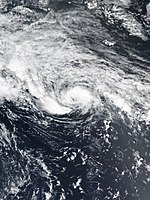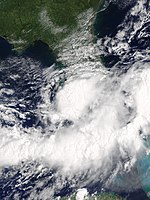2017 AHS
| 2017 Atlantic hurricane season |

Season summary map
|
| Seasonal boundaries |
| First system formed |
April 19, 2017 |
| Last system dissipated |
November 9, 2017 |
| Strongest storm |
|
| Name |
Maria |
| • Maximum winds |
175 mph (280 km/h)
(1-minute sustained) |
| • Lowest pressure |
908 mbar (hPa; 26.81 inHg) |
|
| Seasonal statistics |
| Total depressions |
18 |
| Total storms |
17 |
| Hurricanes |
10 |
Major hurricanes
(Cat. 3+) |
6 |
| Total fatalities |
≥ 416–1,437 total (with uncertainty)
|
| Total damage |
≥ $282.16 billion (2017 USD)
(Costliest tropical cyclone season on record)
|
| Related articles |
|
|
Atlantic hurricane seasons
2015, 2016, 2017, 2018, 2019
|
| Tropical storm (SSHWS) |
|
|
| Duration |
April 19 – April 21 |
| Peak intensity |
50 mph (85 km/h) (1-min) 990 mbar (hPa) |
| Tropical storm (SSHWS) |
|
|
| Duration |
June 19 – June 20 |
| Peak intensity |
50 mph (85 km/h) (1-min) 1007 mbar (hPa) |
| Tropical storm (SSHWS) |
|
|
| Duration |
June 20 – June 23 |
| Peak intensity |
60 mph (95 km/h) (1-min) 991 mbar (hPa) |
| Tropical depression (SSHWS) |
|
|
| Duration |
July 5 – July 7 |
| Peak intensity |
30 mph (45 km/h) (1-min) 1009 mbar (hPa) |
| Tropical storm (SSHWS) |
|
|
| Duration |
July 17 – July 18 |
| Peak intensity |
50 mph (85 km/h) (1-min) 1005 mbar (hPa) |
| Tropical storm (SSHWS) |
|
|
| Duration |
July 30 – August 2 |
| Peak intensity |
60 mph (95 km/h) (1-min) 1001 mbar (hPa) |
| Category 1 hurricane (SSHWS) |
|
|
| Duration |
August 7 – August 10 |
| Peak intensity |
85 mph (140 km/h) (1-min) 981 mbar (hPa) |
| Category 2 hurricane (SSHWS) |
|
|
| Duration |
August 12 – August 17 |
| Peak intensity |
110 mph (175 km/h) (1-min) 962 mbar (hPa) |
| Category 4 hurricane (SSHWS) |
|
|
| Duration |
August 17 – September 1 |
| Peak intensity |
130 mph (215 km/h) (1-min) 937 mbar (hPa) |
The 2017 Atlantic hurricane season was a hyperactive and catastrophic hurricane season, featuring 17 named storms, 10 hurricanes and 6 major hurricanes – ranking it alongside 1936 as the fifth-most active season since records began in 1851. The season also featured both the highest total accumulated cyclone energy (ACE) and the highest number of major hurricanes since 2005. All ten of the season's hurricanes occurred in a row, the greatest number of consecutive hurricanes in the satellite era, and tied for the greatest number of consecutive hurricanes ever observed in the Atlantic basin since records began in 1851. In addition, it was by far the costliest season on record, with a total of at least $282.16 billion (USD) in damages, about $100 billion higher than the total of the previous record holder — the 2005 season. In addition, essentially all of the season's damage was due to three of the season's major hurricanes — Harvey, Irma, and Maria. This season is also one of only six years on record to feature multiple Category 5 hurricanes, and only the second after 2007 to feature two hurricanes making landfall at that intensity. This season is the only season on record in which three hurricanes each had an ACE of over 40: Irma, Jose, and Maria.
The season officially began on June 1 and ended on November 30. These dates historically describe the period of year when most tropical cyclones form in the Atlantic basin. However, as shown by Tropical Storm Arlene in April, the formation of tropical cyclones is possible at other times of the year. In mid-June, Tropical Storm Bret struck the island of Trinidad, which is rarely struck by tropical cyclones, due to its low latitude. In late August, Hurricane Harvey became the first major hurricane to make landfall in the United States since Wilma in 2005, while also setting the record for the costliest tropical cyclone on record, as well as the most rainfall dropped by a tropical cyclone in the United States. In early September, Hurricane Irma became the first Category 5 hurricane to impact the northern Leeward Islands on record, later making landfall in the Florida Keys as a large Category 4 hurricane. In terms of maximum sustained winds, Irma is the strongest hurricane ever recorded in the Atlantic Ocean outside of the Gulf of Mexico and Caribbean Sea. In late September, Hurricane Maria became the first Category 5 hurricane to strike the island of Dominica on record. It later made landfall in Puerto Rico as a high-end Category 4 hurricane. In early October, Hurricane Nate became the fastest-moving tropical cyclone in the Gulf of Mexico while also becoming the fourth hurricane of the year to hit the overall United States. Slightly over a week later, Hurricane Ophelia became the easternmost major hurricane in the Atlantic basin on record, and later impacted most of Northern Europe as an extratropical cyclone.
...
Wikipedia



















